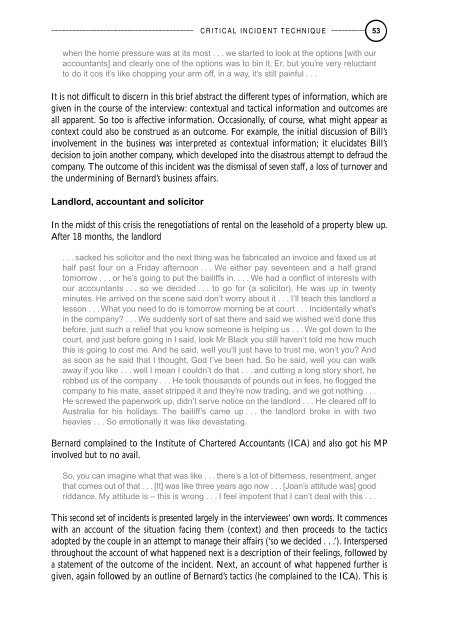essential-guide-to-qualitative-in-organizational-research
essential-guide-to-qualitative-in-organizational-research
essential-guide-to-qualitative-in-organizational-research
- No tags were found...
You also want an ePaper? Increase the reach of your titles
YUMPU automatically turns print PDFs into web optimized ePapers that Google loves.
––––––––––––––––––––––––––––––––––––––––– CRITICAL INCIDENT TECHNIQUE –––––––––– 53when the home pressure was at its most . . . we started <strong>to</strong> look at the options [with ouraccountants] and clearly one of the options was <strong>to</strong> b<strong>in</strong> it. Er, but you’re very reluctant<strong>to</strong> do it cos it’s like chopp<strong>in</strong>g your arm off, <strong>in</strong> a way, it’s still pa<strong>in</strong>ful . . .It is not difficult <strong>to</strong> discern <strong>in</strong> this brief abstract the different types of <strong>in</strong>formation, which aregiven <strong>in</strong> the course of the <strong>in</strong>terview: contextual and tactical <strong>in</strong>formation and outcomes areall apparent. So <strong>to</strong>o is affective <strong>in</strong>formation. Occasionally, of course, what might appear ascontext could also be construed as an outcome. For example, the <strong>in</strong>itial discussion of Bill’s<strong>in</strong>volvement <strong>in</strong> the bus<strong>in</strong>ess was <strong>in</strong>terpreted as contextual <strong>in</strong>formation; it elucidates Bill’sdecision <strong>to</strong> jo<strong>in</strong> another company, which developed <strong>in</strong><strong>to</strong> the disastrous attempt <strong>to</strong> defraud thecompany. The outcome of this <strong>in</strong>cident was the dismissal of seven staff, a loss of turnover andthe underm<strong>in</strong><strong>in</strong>g of Bernard’s bus<strong>in</strong>ess affairs.Landlord, accountant and solici<strong>to</strong>rIn the midst of this crisis the renegotiations of rental on the leasehold of a property blew up.After 18 months, the landlord. . . sacked his solici<strong>to</strong>r and the next th<strong>in</strong>g was he fabricated an <strong>in</strong>voice and faxed us athalf past four on a Friday afternoon . . . We either pay seventeen and a half grand<strong>to</strong>morrow . . . or he’s go<strong>in</strong>g <strong>to</strong> put the bailiffs <strong>in</strong>. . . . We had a conflict of <strong>in</strong>terests withour accountants . . . so we decided . . . <strong>to</strong> go for (a solici<strong>to</strong>r). He was up <strong>in</strong> twentym<strong>in</strong>utes. He arrived on the scene said don’t worry about it . . . I’ll teach this landlord alesson . . . What you need <strong>to</strong> do is <strong>to</strong>morrow morn<strong>in</strong>g be at court...Incidentally what’s<strong>in</strong> the company? . . . We suddenly sort of sat there and said we wished we’d done thisbefore, just such a relief that you know someone is help<strong>in</strong>g us . . . We got down <strong>to</strong> thecourt, and just before go<strong>in</strong>g <strong>in</strong> I said, look Mr Black you still haven’t <strong>to</strong>ld me how muchthis is go<strong>in</strong>g <strong>to</strong> cost me. And he said, well you’ll just have <strong>to</strong> trust me, won’t you? Andas soon as he said that I thought, God I’ve been had. So he said, well you can walkaway if you like . . . well I mean I couldn’t do that . . . and cutt<strong>in</strong>g a long s<strong>to</strong>ry short, herobbed us of the company . . . He <strong>to</strong>ok thousands of pounds out <strong>in</strong> fees, he flogged thecompany <strong>to</strong> his mate, asset stripped it and they’re now trad<strong>in</strong>g, and we got noth<strong>in</strong>g . . .He screwed the paperwork up, didn’t serve notice on the landlord . . . He cleared off <strong>to</strong>Australia for his holidays. The bailiff’s came up . . . the landlord broke <strong>in</strong> with twoheavies . . . So emotionally it was like devastat<strong>in</strong>g.Bernard compla<strong>in</strong>ed <strong>to</strong> the Institute of Chartered Accountants (ICA) and also got his MP<strong>in</strong>volved but <strong>to</strong> no avail.So, you can imag<strong>in</strong>e what that was like . . . there’s a lot of bitterness, resentment, angerthat comes out of that . . . [It] was like three years ago now . . . [Joan’s attitude was] goodriddance. My attitude is – this is wrong . . . I feel impotent that I can’t deal with this . . .This second set of <strong>in</strong>cidents is presented largely <strong>in</strong> the <strong>in</strong>terviewees’ own words. It commenceswith an account of the situation fac<strong>in</strong>g them (context) and then proceeds <strong>to</strong> the tacticsadopted by the couple <strong>in</strong> an attempt <strong>to</strong> manage their affairs (‘so we decided . . .’). Interspersedthroughout the account of what happened next is a description of their feel<strong>in</strong>gs, followed bya statement of the outcome of the <strong>in</strong>cident. Next, an account of what happened further isgiven, aga<strong>in</strong> followed by an outl<strong>in</strong>e of Bernard’s tactics (he compla<strong>in</strong>ed <strong>to</strong> the ICA). This is



